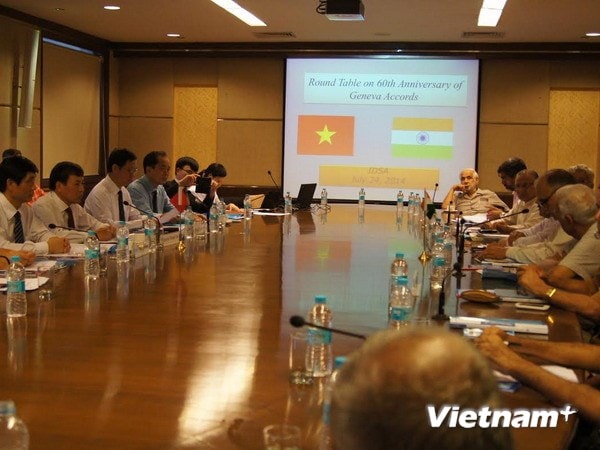Conference to celebrate the 60th anniversary of the Geneva Agreement in India
On July 24, a conference to celebrate the 60th anniversary of the signing of the Geneva Agreement on the cessation of hostilities in Vietnam (July 20, 1954 - July 20, 2014) co-organized by the Vietnamese Embassy and the Indian Institute for Defence Studies and Analyses (IDSA) took place at the IDSA headquarters.
 |
| Conference scene. |
Indian Deputy Foreign Minister for Eastern Affairs Anil Wadhwa, research experts at IDSA, university professors, several former Indian Ambassadors to Vietnam, along with Embassy staff and press reporters attended the workshop.
Speaking at the conference, Vietnamese Ambassador to India Nguyen Thanh Tan recalled the Geneva Conference process and emphasized that the Geneva Agreement was a great victory of great significance for the Government of the Democratic Republic of Vietnam.
For the first time, the French Government and the countries attending the Geneva Conference pledged to respect the independence, sovereignty and territorial integrity of Vietnam. This agreement has legal importance and creates a solid foundation for the Vietnamese people to continue their struggle for complete victory.
The success of the Geneva Conference was a victory for patriotism, determination to gain independence, aspiration for freedom and love of peace of the Vietnamese people. It was also a victory for the young revolutionary diplomacy of the Democratic Republic of Vietnam when it participated for the first time in a multi-party international conference…
According to Ambassador Nguyen Thanh Tan, after nearly 30 years of comprehensive reforms, under the creative leadership of the Communist Party of Vietnam, Vietnam has achieved many great achievements. Vietnam has succeeded in maintaining political and social stability, reducing poverty, and gradually improving the material and spiritual living standards of its people.
In international relations, Vietnam has had deeper integration. Currently, Vietnam has established diplomatic relations with most countries, including strategic partnerships and comprehensive partnerships with major countries and neighboring countries. V
Vietnam has actively participated in international organizations such as ASEAN, APEC, ASEM, UN, etc. and has made positive contributions to maintaining peace and security in the region and the world. Vietnam's prestige and international position have been firmly consolidated. Having experienced wars, the Vietnamese people understand the value of peace. However, Vietnam understands that peace must be associated with independence, sovereignty, unity and territorial integrity.
Ambassador Nguyen Thanh Tan highly appreciated India's role in peace in Indochina, as well as in the International Commission for Supervision of the Geneva Armistice Agreement. In 1954, Indian Prime Minister Jawaharlal Nehru visited Hanoi, followed by Vietnamese Prime Minister Pham Van Dong visiting New Delhi. In 1958, President Ho Chi Minh visited India. In recent years, the Vietnam-India strategic partnership has developed in both breadth and depth for the benefit and prosperity of the people of the two countries, for peace and solidarity in the region and the world.
Speaking at the workshop, Deputy Minister Anil Wadhwa emphasized that the 60th anniversary of the Geneva Agreement is also an opportunity to foster the Vietnam-India relationship, a relationship built on the foundation of trust and cooperation between the two countries over time.
Mr. Wadhwa commented that India and Vietnam have a long tradition of close relations. After more than 40 years of establishing full diplomatic relations and a strategic partnership in peace, the India-Vietnam bilateral relationship is at a period of strong development. Historical ties, along with convergence of strategic and security interests, are expanding and deepening economic and cultural ties between the two countries.
Rapid geopolitical changes in the region have created opportunities and challenges for Vietnam and India. To fully exploit the potential in a mutually beneficial manner and jointly overcome challenges that may threaten their common interests, India and Vietnam need to work together. Vietnam must believe that India will be its “all-weather” friend.
Former Indian Ambassadors to Vietnam, President of the India-Vietnam Friendship Association KL Malhotra, Minister Counselor of the Vietnamese Embassy in India Tran Quang Tuyen, Chief of the Vietnamese Defense Attaché in India, Colonel Pham Thanh Luong, and a number of scholars presented papers on the significance of the Geneva Agreement and the development process of India-Vietnam relations.
According to Vietnam+






